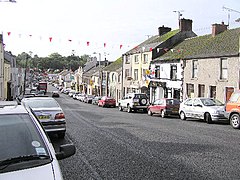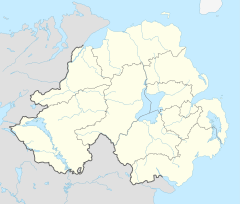Ballygawley, County Tyrone
Ballygawley
|
|
|---|---|
 |
|
| Ballygawley shown within Northern Ireland | |
| Population | 642 (2001) |
| Irish grid reference | H630574 |
| • Belfast | 52 mi (84 km) |
| District | |
| County | |
| Country | Northern Ireland |
| Sovereign state | United Kingdom |
| Post town | DUNGANNON |
| Postcode district | BT71 |
| Dialling code | 028, +44 28 |
| EU Parliament | Northern Ireland |
| UK Parliament | |
| NI Assembly | |
Ballygawley or Ballygawly (from Irish: Baile Uí Dhálaigh, meaning "Ó Dálaigh's townland") is a Town in County Tyrone, Northern Ireland. It is about 13 miles southwest of Dungannon, near the meeting of the A5 Omagh–Monaghan and A4 Dungannon–Enniskillen roads.
An American visitor in 1925 commented on the way the village was laid out: "...Ballygawley, which I found to be a village or settlement on two streets (or possibly on one street which turned at right angles to my left as I stood looking at the buildings when I came in sight of the place). It was a wide street, with excellent cement sidewalks not very wide, and the buildings came up flush with the sidewalks, and there were no alleys, driveways or paths between the buildings."
It is a compact village around the ‘L’ shaped Main Street and Church Street,formerly Meeting House Street, with a second cluster of development to the southwest. The main cluster inholds most of the village’s facilities; two primary schools, churches and a range of shops and services. The cluster of development to the southwest inholds a secondary school and housing. Ballygawley had a population of 642 at the 2001 Census.
Ballygawley is also known as "Errigal-Kerogue" or "Errigal-Kieran", supposedly from the dedication of an ancient church to St. Kieran (Ciarán of Clonmacnoise). It was in the Clogher (barony), along the River Blackwater, Northern Ireland. Some of the remains of the old church were known, and an ancient Franciscan friary, founded by Conn O'Neill, 1st Earl of Tyrone. In the churchyard was a large stone cross, and a holy well.
For more information see The Troubles in Ballygawley, which includes a list of incidents in Ballygawley during the Troubles resulting in two or more fatalities, as well as:
...
Wikipedia

